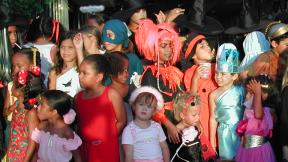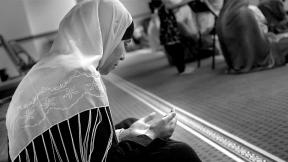
As a Muslim student, you should try to set the best example that you can.
Always be friendly, generous, helpful and open-minded, yet firm about your beliefs.
When misinformation about Islam or misrepresentation of Muslims occurs in the classroom, there are several things you can do. By working to correct the coverage of Islam and Muslim history, you can help ensure accuracy, balance, and sensitivity.
Tip #1: Do not blame the teacher
First of all, remember that in most cases, blaming the teacher is a big mistake. Teachers are overburdened as it is just trying to teach their students, and they do not determine the contents of textbooks.
Take the approach of a helper or contributor, rather than "challenging" the teacher, and you will be far more successful in making changes.
Tip #2: Raise your hand
Here are a few suggestions for contributing to better coverage of Islam in your classroom: Raise your hand
First of all, evaluate your world history, world cultures, geography, or comparative religions textbooks' coverage of Islam carefully. If you find an error or inaccuracy in the textbook, or if during discussion someone makes an incorrect statement, do not hesitate to raise your hand and offer the proper perspective or correct information.
Tip #3: Relate your personal experiences
Whenever you discuss different topics and issues in class, always try to Incorporate your own personal experiences into the conversation.
Using a personal approach allows others to see Muslims as human beings, rather than just characters in the media and textbooks.
Share what it is like living as a Muslim in the United States, and include both triumphs and difficulties.
For example, you might talk about the importance of daily worship (Salah) or fasting during Ramadan (Sawm) and the difficulties which often arise when Muslims try to perform their religious duties in the course of the day.
Tip #4: Do an oral or written report on Islam
When Islam is discussed in the classroom, ask your teacher if you can write or orally present a report on a specialized topic related to Islam and present it in class.
In the report, try to incorporate an Islamic perspective on issues pertinent to your age group, for example gender relations, peer pressure, education, etc.
Other important topics might be the importance of fasting in Ramadan, the importance of family in Islam, among others.
Offer a presentation on Ramadan, and bring special foods and sweets to class to celebrate and share the Eid holidays.
Make it a point to use Islamic sources for your report. Collect information from the Quran, books of Hadith, and other books dealing with your topic. Try to make researching the topic an exciting part of the report.
Interview your parents, friends, and other relatives about the chosen topic as well. If possible, contact the Imam or other knowledgeable person from your local Islamic center or Masjid and obtain their insights and information. Also obtain help from Muslim professors and educators.
Tip #5: Invite a Muslim speaker to your class
Invite your parents, older brothers or sisters, or knowledgeable persons from the community to come to your class and conduct a presentation on Islam.
You might also try to establish a local speakers bureau comprised of community members, to provide speakers on a regular basis to classrooms in your area.
Tip #6: Share a video
Many videos on Islam and Muslim history have been produced by Muslim organizations, some of which may be suitable for middle and high school audiences. Select an appropriate video and request your teacher to show it in your class as part of the course.
Offer the teacher an opportunity to review the video beforehand. Make sure that the contents do not contain material which might give offense to people of other faiths or traditions.
Some good topics for videos include the Hajj, Islam in America, the genocide in Bosnia-Hercegovina, and Islamic contributions to science, among others. Contact the Council on Islamic Education for a list of videos recommended for public school use.
Tip #7: Be creative
Come up with additional ideas for sharing information about Islam.
For more information, contact the Council on Islamic Education at:
Office: 9300 Gardenia St. #B-3, Fountain Valley, CA 92708
Mail: P.O. Box 20186, Fountain Valley, CA 92728-0186
tel: 714-839-2929 fax: 714-839-2714 e-mail: info@cie.org








Comments
i was fascinated bu this topic.
Location
this great...! now i can have a good information for my paper..!
Location
Add new comment